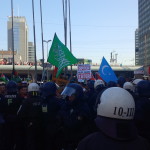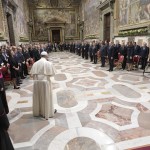Armed Hungarian policemen seem to pester the family of refugees thrown on the railway track. The man seems to defend with his own body the woman and a little baby. The picture taken on September,3rd last year on the Bicske railway station by Reuters’ photojournalist Laszlo Balogh was published by newspapers and internet sites worldwide.
But on that day the station Bicske was crowded with tv crews and the entire episode was filmed, shown in many countries and obviously found it’s way to Facebook. Hence it turned out very soon that Mr Balogh perpetrated a smart ideological manipulation. Here is what really happened: a refugee, not threatened by anybody, in front of a pack of journalists brutally grabs a standing nearby woman with a baby in her arms and throws himself with them on the rails. His intentions and reasons are not clear, apart from the desire to be filmed and photographed. The woman calls for help. Two Hungarian policemen arrive, drag the man away, help her get on feet. She thanks them. The end.
And Mr Balogh’s photo was awarded the prestigious Pulitzer Prize. Well, the photo was not posed. It shows in a very dynamic way the drama of the refugee family not only struck by the gloom reality at home, but also persecuted by the strongmen of the boogey-man, half-fascist Hungarian prime minister Viktor Orban. Many European newspapers exposed and strongly criticized the falsehood a few days after the photo had been published. The Pulitzer Prize jury must have known what really happened in Bicske but nonetheless the wise, righteous men decided to award the politically correct lie disguised as truth.
What is sad, nobody protested. As it seems, the truth of the message in journalism and arts is becoming irrelevant. Nowadays the falsehood, if committed for the “right” cause, is not only being tolerated but brings about an international acclaim. More and more often prestigious awards serve to promote the politically correct set of ideas and views and the only right ideology.
Michael Moore did not win the Palme d’Or at the 2004 Cannes film festival for the artistic value of his “Fahrenheit 9/11”. He won the prize because his film strongly (and often rightly) criticized president Bush-jr. Barack Obama won the Noble Peace Prize a few months after he had taken his office not for his immortal achievements, but for his social and political views, very dear to the lef-leaning Norwegian Noble Committee.
I poliziotti ungheresi che si stanno accanendo contro una famiglia di profughi siriani gettata sulle rotaie di una ferrovia. L’uomo copre con il proprio corpo la donna che stringe al seno un neonato. Questo è il messaggio che veicola la fotografia scattata il 3 settembre scorso alla stazione di Bickse da un fotoreporter della Reuters, Laszlo Balogh. Un’immagine che ha fatto il giro del mondo.
Alla stazione vi erano alcune decine di fotoreporter e cameraman delle televisioni di diversi Paesi. Così molte emittenti hanno mostrato la scena nella sua interezza e subito si è visto che il fotografo ungherese è autore di un’immagine ideologicamente falsata.
Poiché le cose sono andate in modo del tutto diverso: il profugo, senza minaccia alcuna e forse perché davanti alle telecamere, acchiappa la donna con il bambino e insieme a loro si getta sulle rotaie. La donna grida aiuto. Compaiono i poliziotti ungheresi che, con la forza, allontanano l’uomo dalla donna, gli mettono le manette, aiutano ad alzarsi la donna col bambino che ringrazia.
Nonostante si conoscesse l’intera scena Balogh ha ricevuto per il suo scatto il prestigioso premio Pulitzer. È vero, la foto non è una messa in scena. Mostra con grande dinamismo il dramma di una famiglia di profughi, perseguitata apparentemente dalla polizia ungherese. La giuria dell’Università di Columbia evidentemente ha considerato che il falso ma ideologicamente corretto significato della foto è degno del premio. Quello che stupisce però è che nessuno abbia protestato. Così un ennesimo falso vestito da verità con tutti i diritti dimora fra noi.
La verità del messaggio – mediatico, storico o artistico – non è più importante. Per aver truffato, purché a fin di bene, non si viene più nemmeno rimproverati, ma si ricevono onorificenze e i premi di prestigio sembrano sempre più utili alla promozione delle opinioni considerate giuste.
Proprio per le stesse ragioni, e non per il riconoscimento del valore artistico, la Palma d’oro nel 2004 venne conferita al documentario di Michael Moore “Fahrenheit 9.11”, che cercava di compromettere la figura del presidente americano George Bush jr. E così Barack Obama ha ricevuto il Nobel per la Pace per le sue opinioni e la buona volontà e non per aver compiuto delle opere particolarmente importanti.
Pulitzer za subtelne oszustwo
Jak się wydaje, Węgierscy policjanci pastwią się nad rzuconą na tory kolejowe rodziną syryjskich uchodźców. Mężczyzna zasłania własnym ciałem kobietę tulącą niemowlę. Zdjęcie wykonane 3 września ubiegłego roku na stacji Bicske przez fotoreportera Reutersa Laszlo Balogha i obiegło cały świat.
Ale na stacji było kilkudziesięciu reporterów tv z różnych krajów, więc wiele telewizji pokazało scenę w całości i natychmiast okazało się, że Węgier dopuścił się ideologicznej manipulacji. Sprawy miały się bowiem zgoła inaczej: uchodźca, choć nikt mu nie zagraża, zapewne na użytek kamer, chwyta kobietę z dzieckiem i rzuca się z nimi na tory. Kobieta woła o pomoc. Za chwilę pojawiają się węgierscy policjanci, odciągają mężczyznę, zakuwają w kajdanki, pomagają kobiecie z dzieckiem wstać, a ta im dziękuje.
Mimo to Balogh właśnie otrzymał za to zdjęcie prestiżową nagrodę Pulitzera. Cóż, zdjęcie pozowane nie jest. Pokazuje w dynamicznym ujęciu dramat uchodźczej rodziny, prześladowanej na dodatek przez uzbrojonych po zęby siepaczy Orbana. Jury Uniwersytetu Columbia najwyraźniej uznało, że sfałszowana, za to ideologicznie słuszna wymowa fotki godna jest nagrody. Co uderza, nikt nawet nie zgłosił protestu. W efekcie kolejne przebrane za prawdę kłamstwo na pełnych prawach zamieszkało między nami.
Prawda przekazu – medialnego, historycznego czy artystycznego – przestała być istotna. Za fałsz, byle w słusznej sprawie, już nie ganią, a przypinają ordery. Prestiżowe nagrody służą promowaniu jedynie słusznych poglądów. Dlatego, bo przecież nie za walory artystyczne, Złotą Palmę w Cannes w 2004 r. zdobył kompromitujący Busha jra dokument Michaela Moore’a „Fahrenheit 9.11”. Dlatego Barack Obama dostał w 2009 r. pokojowego Nobla zaraz po objęciu urzędu za swoje poglądy i dobre chęci, a nie za wiekopomne dokonania.
Piotr Kowalczuk
Latest posts by Piotr Kowalczuk (see all)
- Pulitzer for a “subtle lie” - 14 maggio 2016
- Casus Savchenko: a symbol for Russia and Ukraine - 3 aprile 2016
- Lech Wałęsa, the victim of history and of his own - 23 febbraio 2016











